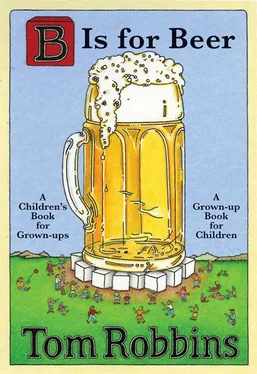Gracie tried to think about it, but it proved to be a thought her thinker could not think on. When he realized that, concentrate as she might, the little girl was only bewildered by his philosophizing, the Moester took a mighty gulp from the bottle, then offered it to her.
“Beer is at its best when drawn directly from a tapped keg,” he said, “but a glass bottle is superior to a can. Cans are more convenient and they’re here to stay, but the aluminum’s fluctuating temperature does mess with the purity of the flavor.” To Gracie’s nine thousand eager but inexperienced taste buds, the flavor of the beer from the bottle proved every bit as icky as the flavor from the can, so after one cautiously optimistic swallow she gave the brewski back, sadder Budweiser.
Nodding at the face she made, as well as at the jammies she still wore (pajamas being the official uniform of inertia and depression), Uncle Moe said cheerfully, “The world is a wonderfully unpredictable place, my dear, we’re seldom as limited as we think we are, and every cloud has a silver headline. For example, my podiatrist turned out to be an absolutely gorgeous representative of the female sex. I mean, if good looks were two flakes of snow, she could provide nesting grounds for half the Earth’s penguins.
“Dr. Proust has straight black hair so long it would take a spider monkey twenty minutes to climb the length of it, she had on a silk dress as red as a terrorism alert, silver sandals, ornate jewelry, and some kind of glittery savage eye shadow, and in general looks more like a gypsy than a surgeon. Maybe it’s not surprising that she wants to take a knife to me on Thursday.” He grinned. “I can hardly wait.” He paused to finish his beer.
“At one point, she informed me that she was half-Jewish and half-Italian. I said, ‘That’s a splendid combination, Doctor, but under those conditions I have an urgent request: I want your Jewish half to perform the surgery. Okay? All right? Save the Italian part for cooking and singing.”
From Gracie’s quizzical expression he could tell that his wit was lost on her, the girl being as yet innocent of cultural stereotyping, so he patted her small hand in affectionate appreciation, and, struggling with his crutches, forced himself free of the sofa.
“Here’s the deal, pumpkin. Following surgery, I’ll be as gimpy as a rusty robot for at least a week, but by the time of your birthday I should be getting around fairly well. You’ll be having a party on the big day, I suspect, but the next day, when you’ve rested from the festivities, we’ll go tour the Redhook brewery just as we’d originally planned. Only we won’t be freighted there aboard some motorized Prozac box. I’m going to pick up the birthday girl in a stretch limousine. Can you dig it?”
Dig it she could, for she was an excellent digger. And when Moe left, Gracie skipped into the dining room and consumed every drop of the tomato soup, even though by then it was approximately as cold as Moe’s Budweiser had been. Then she skipped up the stairs (which is kind of a dangerous practice actually, one you shouldn’t attempt without adult supervision), where she changed into jeans and her Give Peace a Chance sweatshirt. She opened her sock drawer and removed a pair of pink ones. She held them at eye level and spoke to them directly. “Socks,” she addressed them, “you oughta know the answer to this question: how come Americans tie their shoes too tight?”
Not surprisingly, the socks remained silent, as was their legal right. Gracie, on the other hand, could not suppress a giggle. It would appear that she’d gotten her groove back. But maybe we should keep our fingers crossed for her, wouldn’t you agree?
The week passed as slowly as a snowman’s gas. Each drizzly day limped into the next, as if a falling can of Sapporo had broken the day’s sunset toe and torn its sunrise tendon. In kindergarten that week, Gracie was taught nothing she didn’t already know; midway through Finding Nemo , she suddenly found that thirty-six viewings had been quite enough; and though she badly wanted to visit the recuperating Uncle Moe and bring him a bouquet of flowers or something, her daddy was always too busy to drive her downtown and her mommy was always too tired. It was frustrating.
She did call Moe after his surgery, of course, regretting all the while that she couldn’t have made the call on that pink cell phone she was expecting for her birthday and on which niece and uncle might have enjoyed an actual private conversation. And truth be told, it was only the anticipation of her approaching birthday that kept the lights on in her eyes and the skip in her step that week.
Having said all this, however, the week can be described as totally dull and uneventful only if Sunday isn’t counted. It’s probably permissible to leave out Sunday because in America and Europe, Sunday generally isn’t considered a weekday. You yourself must admit that, for various reasons, there’s something different about Sundays. Sundays look different, feel different, even smell different than the other six days. Sundays have a different color (usually white), a different texture (starched linen), and a different flavor (kind of like mashed potatoes) than even Saturdays (which are crimson and taste like weenies and beer). In some American cities, incidentally, it’s illegal to sell beer on Sundays, but that’s a different story.
In any case, an incident occurred that Sunday that wasn’t strictly normal, that caused it to further stand out from the week’s other days, and that Gracie would not soon forget. It happened in church. (Some silly people used to refer to beer openers as “church keys,” but that’s a different story, as well.)
For reasons of her own, the Sunday school teacher had directed Gracie to sit in the front row that morning, and being a polite youngster, she obeyed without question or objection, although she was aware that from time to time she might have to hold her nose to keep from gagging.
Taking the third chapter of the Gospel of John as her authority, the teacher had been discoursing forcefully and at considerable length about the necessity to be “born again”—a concept that Gracie, frankly, had never fully comprehended — when she, the teacher, noticed that a shoelace had come undone and bent to tie it (undoubtedly much tighter than function required). Taking advantage of the lull, Gracie impulsively acted to contribute to what so far had been a one-sided discussion.
“My uncle Moe says that when he dies he’s gonna be born again as a vinegar eel.”
Still in the process of knotting her lace, the teacher commenced to sputter, but before she could straighten up, a curious boy asked, “What’s that?”
“Oh,” said Gracie in her chirpy voice, “a vinegar eel is a paradise — no, I mean…a para site ; yeah, that’s right, a parasite that lives I think in Germany. It bores into the sides of beer steins over there — they’re made outta clay, you know — and it lives on the foam that slops over the top. Uncle Moe…”
“Enough!” screeched the teacher. She seized the startled Gracie by the shoulders and yanked her from her chair. “That’ll be enough out of you, little heathen.” Her face the color of a grape Popsicle, she pulled Gracie to the door and shoved her through it. “You wait out here until after class. We’ll deal with you later.”
The Sunday school building was connected to the main church by a colonnade, which, we’d better explain, is a narrow walkway covered by a roof that’s supported by columns. One side of this walkway was open to the weather, and you can guess — can’t you? — what Seattle’s weather was like that morning. (If you said “drizzly,” you’re a winner.) And because the season was late October, it was also rather chilly. Therefore, when Mrs. Perkel came upon Gracie in the colonnade to which the bewildered girl had been exiled, there was a fair amount of shivering, chattering, and sniffling going on.
Читать дальше












